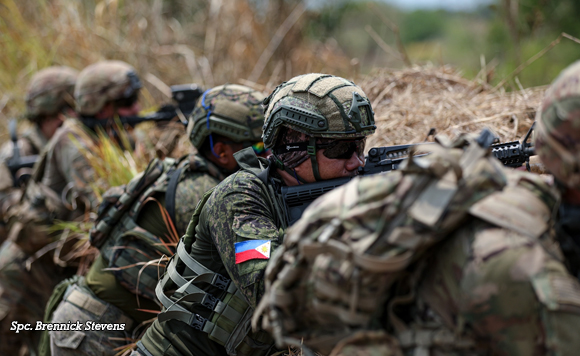Larger-Than-Ever Balikatan Exercises To Strengthen US-Philippines Alliance

Table of Contents
Unprecedented Scale and Scope of Balikatan Exercises
The 2024 Balikatan Exercises represent a substantial increase in scale and scope compared to previous years. This expansion reflects the deepening commitment of both nations to enhancing their combined military capabilities and addressing shared security concerns.
Increased Participation
This year's Balikatan exercises saw a record number of participating troops. While precise figures are still being finalized, initial reports suggest a significant increase over previous years, with thousands of personnel from both the US and Philippine armed forces taking part. The participation includes various units, from the US Army and Marine Corps to the Philippine Army, Navy, and Air Force, demonstrating a comprehensive approach to joint military training.
Expanded Training Areas
The geographical reach of the Balikatan exercises has also expanded significantly. Training locations span a wider range of strategic areas within the Philippines, encompassing diverse terrains and operational environments. This expansion allows for more realistic simulations of potential scenarios and enhances the adaptability of both militaries. New training grounds have been added, reflecting the focus on addressing modern security challenges.
- Specific numbers of personnel: (Insert updated numbers when available. Example: Over 17,000 troops participated, with approximately 12,000 from the US and 5,000 from the Philippines.)
- Key training locations: (Insert specific locations and their strategic importance. Example: Luzon Island, Palawan, key areas near the South China Sea.)
- Advanced equipment: (Insert details on any advanced equipment used. Example: High-tech communication systems, advanced drones, amphibious assault vehicles.)
- Unique training scenarios: (Insert details. Example: Cybersecurity defense drills, complex amphibious assault simulations, counter-terrorism training in urban environments.)
Strengthening Interoperability and Joint Capabilities
A core objective of the Balikatan Exercises is to enhance interoperability and joint capabilities between the US and Philippine militaries. The exercises are designed to improve coordination, communication, and combined operational effectiveness.
Combined Operations
The exercises feature a wide range of combined operations, designed to test and refine the ability of both forces to work together seamlessly. These include:
Enhanced Communication and Coordination
Improved communication and coordination are paramount in successful joint operations. The Balikatan exercises explicitly focus on refining communication protocols, integrating communication systems, and streamlining command structures. This involves:
- Examples of joint operations: (Insert specific examples. Example: Amphibious landings on simulated enemy beaches, live-fire exercises involving coordinated artillery and air support, joint urban warfare training.)
- Improvements in communication protocols: (Insert examples. Example: Implementation of new encrypted communication systems, joint training on crisis communication strategies.)
- Enhanced coordination capabilities: (Insert examples. Example: Improved procedures for joint planning, execution, and assessment of military operations.)
Addressing Shared Security Challenges in the Indo-Pacific
The Balikatan Exercises directly address several shared security challenges facing the US and the Philippines in the Indo-Pacific region. This includes:
Countering Terrorism and Insurgency
The exercises feature scenarios focused on counter-terrorism and counter-insurgency operations, reflecting the shared commitment to combating these threats. Training involves:
Maritime Security Cooperation
Protecting sea lanes and countering illegal activities at sea are critical aspects of regional security. The Balikatan exercises emphasize:
Humanitarian Assistance and Disaster Relief (HADR)
The inclusion of HADR training highlights the alliance’s broader commitment to regional stability. These exercises prepare both militaries to respond effectively to natural disasters and humanitarian crises.
- Counter-terrorism and insurgency scenarios: (Insert details. Example: Simulations of counter-insurgency operations in jungle environments, hostage rescue exercises, urban warfare scenarios.)
- Maritime security cooperation: (Insert details. Example: Joint maritime patrols, search and rescue exercises, anti-piracy training.)
- HADR training exercises: (Insert details. Example: Disaster response simulations, medical evacuation drills, provision of humanitarian aid in disaster zones.)
- Connection to Indo-Pacific strategies: (Explain the connection. Example: The exercises align with broader US and Philippine strategies for maintaining peace and security in the Indo-Pacific, contributing to a free and open Indo-Pacific.)
The Significance of the Enhanced US-Philippines Alliance
The strengthened US-Philippines alliance, as demonstrated by the expanded Balikatan Exercises, holds significant geopolitical weight.
Geopolitical Context
The enhanced alliance is particularly significant in the context of rising regional tensions and power dynamics, especially in the South China Sea. The exercises send a clear message of commitment to regional stability and deter potential aggression.
Mutual Defense Treaty
The US-Philippines Mutual Defense Treaty forms the bedrock of the bilateral relationship and has direct implications for the scope and nature of the Balikatan exercises. The treaty’s provisions underpin the joint military training and enhance the credibility of mutual defense commitments.
- Regional security challenges: (Discuss specific challenges. Example: Territorial disputes in the South China Sea, the rise of China's military power, the threat of transnational terrorism.)
- Implications of the Mutual Defense Treaty: (Explain the implications. Example: The treaty provides a framework for joint military action in response to armed attacks, strengthening the deterrence against potential aggressors.)
- Increased US military presence: (Discuss the implications. Example: Increased US military presence in the Philippines bolsters the country's defense capabilities and reinforces the commitment to regional security.)
Conclusion
The larger-than-ever Balikatan Exercises represent a crucial milestone in the US-Philippines alliance. The unprecedented scale of these joint military training exercises, the enhanced interoperability achieved, and the strengthened commitment to addressing shared security challenges in the Indo-Pacific region are all significant achievements. These exercises underscore the importance of the bilateral partnership in maintaining regional stability and security. To learn more about the Balikatan exercises and the ongoing strengthening of the US-Philippines military alliance, follow the Balikatan exercises closely through official government channels and reputable news sources. Stay updated on future joint military training and its role in Indo-Pacific security.

Featured Posts
-
 D Wave Quantum Qbts Stock Soars Analysis Of Recent Market Performance
May 20, 2025
D Wave Quantum Qbts Stock Soars Analysis Of Recent Market Performance
May 20, 2025 -
 Robin Roberts Response To Gma Layoffs A Look Inside
May 20, 2025
Robin Roberts Response To Gma Layoffs A Look Inside
May 20, 2025 -
 Germanys 5 4 Aggregate Victory Sends Them To Uefa Nations League Final Four
May 20, 2025
Germanys 5 4 Aggregate Victory Sends Them To Uefa Nations League Final Four
May 20, 2025 -
 Man Utd Facing Newcastle In Race To Sign Promising Premier League Winger
May 20, 2025
Man Utd Facing Newcastle In Race To Sign Promising Premier League Winger
May 20, 2025 -
 Understanding D Wave Quantums Qbts Monday Stock Price Decrease
May 20, 2025
Understanding D Wave Quantums Qbts Monday Stock Price Decrease
May 20, 2025
